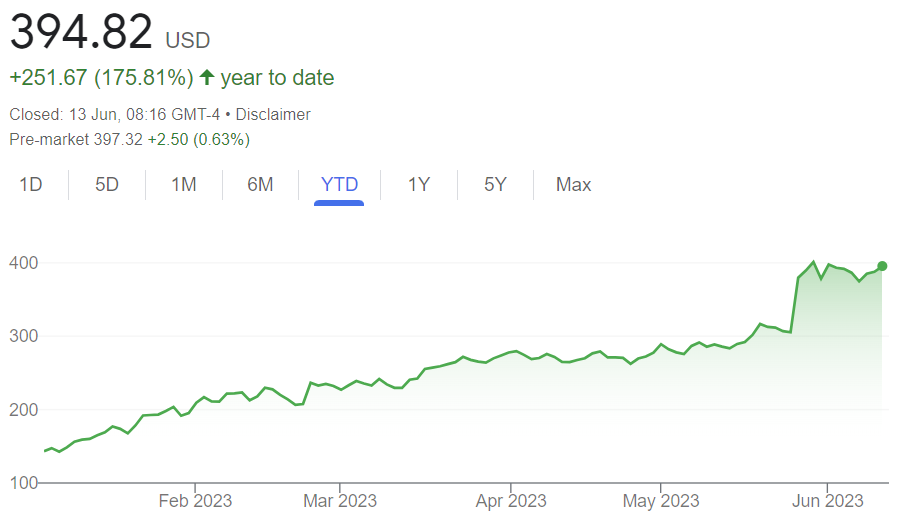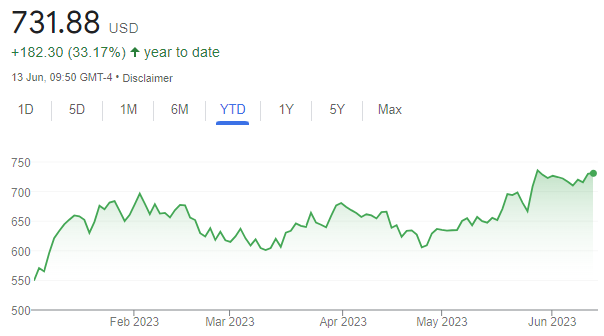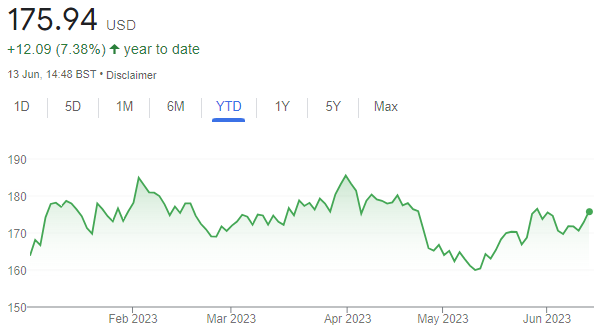In late 2022, US president Joe Biden banned semiconductor exports to China, but it was the rise of generative artificial intelligence (AI) that caused investors to flock into semiconductor stocks.
As a result, the shares of hardware and software supplier Nvidia have almost quadrupled in price over the year to date, as profit hunters have taken a picks-and-shovels approach by backing AI through its components and enablers, such as semiconductors and businesses like Nvidia, rather than taking riskier positions in companies fully focused on this technology.
Stock price over the year to date

Source: Google Finance
Below, five experts discuss whether semiconductor companies are worth the hype and the current valuations, and propose alternative investments for the sceptical and more cautious investors.
Neuberger Berman’s Zakalik: AI tide will lift many semiconductor boats
Jamie Zakalik, research analyst at Neuberger Berman, was among the enthusiasts.
“For the semiconductor industry, AI is going to be a rising tide that can lift many boats. Regardless of what ends up becoming the next killer AI application, semiconductors benefit as the critical building blocks of back-end infrastructure,” he said.
“This is why $1trn for Nvidia is a milestone for the industry, but not the destination.”
Baillie Gifford’s Budden: ‘Understanding valuation when in the foothills of AI expansion is almost impossible’
Another fan was James Budden, marketing director at Baillie Gifford, said that all the dominant players in the sector - ASML, TSMC and Nvidia – “clearly have room to succeed”, as they don’t compete against each other.
ASML is a supplier to the industry providing the lithography integrated into circuit production while. TSMC is a major customer of ASML. Nvidia makes processers which are used in the gaming, mobile, automotive industries and now frequently in the data centres powering AI development. TSMC makes the chips themselves.
Stock price over the year to date

Source: Google Finance
“These firms would seem obvious beneficiaries of the noise around the potential of AI. All have significant market share but in differing areas of expertise,” Budden said.
“There is clearly room for all to succeed. Understanding valuation when in the foothills of AI expansion is almost impossible. It is perhaps better to consider probabilities surrounding growth. In that respect, all these firms look well placed.”
Saxo UK’s White Thomson: ‘Investors shouldn’t get sucked in and overpay dramatically’
The sceptical voices begin with Charles White Thomson’s, chief executive at Saxo UK.
“The turf war for AI will continue and will include both hype and fact. We see this in the recent stellar share price performance of AI related technology companies - most notably Nvidia. Investors should be wary of the hype and not get sucked in to dramatically overpaying for these assets,” he said.
“A good AI strategy is now a must with a dual track focus on how to harness and how to defend where business models are vulnerable. There will be casualties at the company level where AI starts to make businesses obsolete or severely challenged. The Kodak/Apple scenario is one that comes to mind as I consider this. Building a short basket of these companies is one idea.”
DeVere’s Green: ‘This hype is dangerous’
Nigel Green, chief executive of financial consultancy firm deVere, used an even-more-worried tone, saying that “the frenzy” about the tech mega-caps, including Nvidia, is reaching fever pitch.
“While I believe that exposure to mega-cap tech stocks should be part of almost every investor’s portfolio, as they have robust fundamentals and are future-focused, especially in AI, this hype is dangerous, as it could lead investors to assume that these stocks are a silver bullet to build long-term wealth – and they are not,” he said.
“Even if the Federal Reserve takes a pause [from hiking interest rates] this month, we do expect further rises, which could potentially hit these powerhouse stocks, so sectors that do well in a stagflationary environment should also be included in portfolios.
“These include commodities, such as oil, as their prices typically rise in response to inflation; consumer staples like food, and hygiene products, as demand is likely to remain relatively stable; healthcare, as it provides essential services that are less affected by economic cycles; and utilities, including electricity, gas, and water as demand will also be pretty consistent.”
JPMorgan’s Witherow: ‘There are two ways to look at semiconductors’
Speaking to Trustnet at the end of 2022, Sam Witherow, co-manager of the JP Morgan Global Equity Income fund, highlighted Texas Instruments, which he described as more defensive than the other options.
Stock price over the year to date

Source: Google Finance
“There are two ways to look at semiconductors. On one side, there are the cutting-edge, ultra-advanced chips that go into smartphones, data centres and so on. On the other side are the slightly less advanced nodes, the relatively simple chips that especially go into automotive, industrial and use cases. These chips, while they're not that advanced, are incredibly durable,” he said.
“They need to last for a long period of time and can't fail. The pressure sensor in your car tire can't fail because that might result in a crash. So the companies that produce these chips have a competitive advantage in how safe and long-lasting they can make their products. As a result, you get a very consolidated industry with only a handful of companies that clients really trust, including Texas Instruments.
“The business is incredibly defensive and very diversified and there's very high profitability because of that consolidated market structure. It has 73% gross margins, which means in a macroeconomic down cycle, it doesn't get affected that much. Stock performance has reflected that defensiveness.”





